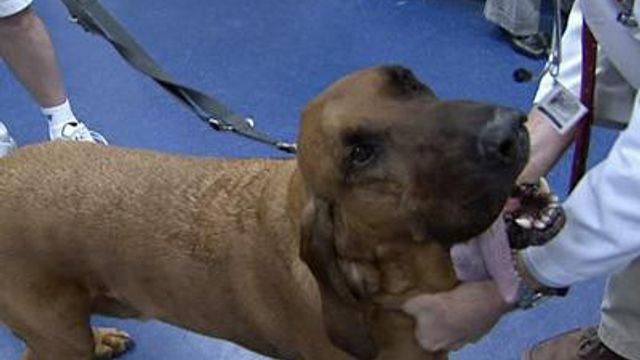Researchers find similarities in lymphoma among humans, canines
Dogs may be closer to humans than you may think. At least that is what researchers are trying to determine as they work to improve lymphoma treatment for people.
Posted — UpdatedTruman is a 6-year-old bloodhound. Last summer, owners Sharman and Clayton Veger noticed swelling in the lymph nodes on his face.
“When we took him to the vet, she showed us that his neck was completely swelled up, which is the lymph nodes as well,” Sharman Veger said.
Truman had lymphoma. The Vegers then took him to the North Carolina State University's College of Veterinary Medicine for chemotherapy.
University of North Carolina at Chapel Hill Lineberger Comprehensive Cancer Center researchers are taking lymphatic tissue samples from dogs, like Truman, to compare to humans with non-Hodgkin's lymphoma. Dogs may actually be better cancer models than lab mice bred with the disease.
“These dogs that came into the clinic that have a spontaneously occurring lymphoma, just like what happens in people,” said Dr. Kristy Richards, UNC clinical oncologist.
N.C. State veterinarian Dr. Steve Suter said lymphoma represents up to 70 percent of the clinic's canine cancer cases. He said researchers need proof of the similarities to humans.
“To determine if the disease is also a bunch of separate diseases, just like in the human population,” Suter said.
Using dogs as cancer models could speed the process of finding new drugs for humans.
“Whoever benefits, we're happy to participate in it,” Sharman Veger said.
The Vegers said they are also happy because Truman's cancer is in partial remission, and the treatments he gets every two weeks aren't difficult for him.
“He doesn't even act like he's getting treatment," Sharman Veger said. "He is just as happy and easy going as he's every been."
N.C. State veterinarians said the lymphatic tissue collection causes no discomfort to the dog, and owners receive $1,000 for their pet's participation.
• Credits
Copyright 2024 by Capitol Broadcasting Company. All rights reserved. This material may not be published, broadcast, rewritten or redistributed.





